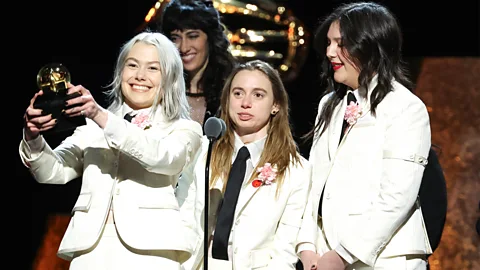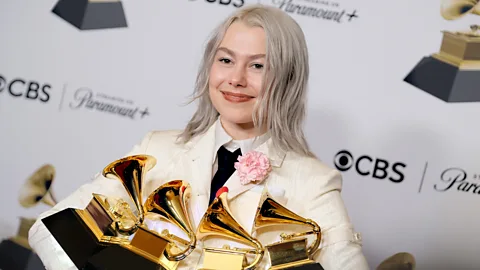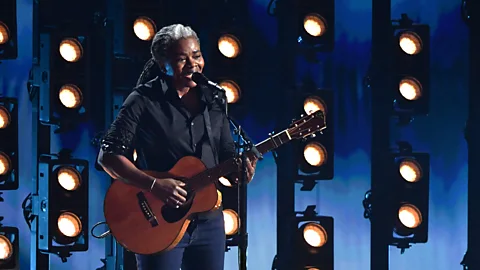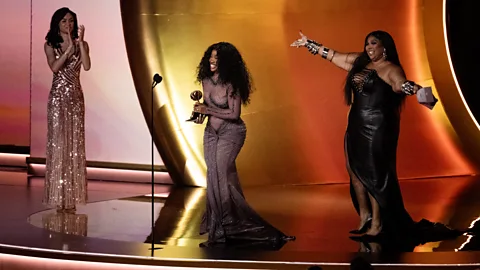By Brittney McKennaFeatures correspondent

 Getty Images
Getty Images
Bridgers referenced ex-CEO’s remarks that women need to “step up”, while Taylor Swift, Tracy Chapman and other woman artists made Grammy history.
This article contains language that some may find offensive
Phoebe Bridgers isn’t one to pull punches. At Sunday’s Grammy Awards, where she took home four trophies for her work with boygenius and SZA, Bridgers dressed down former Recording Academy CEO Neil Portnow, who, in 2018, infamously remarked that if women want greater representation at the awards show, they would need to work harder.
More like this:

 Getty Images
Getty Images
“The ex-president of the Recording Academy, Neil Portnow, said that if women want to be nominated and win Grammys, that they should ‘step up,'” Bridgers said in the Grammy press room, after boygenius won three awards. “To him, I’d like to say, ‘I know you’re not dead yet, but when you are, rot in piss.'”
It’s a strong statement, and one rooted in a real struggle faced by women artists – as well as those from other marginalised groups – to be recognised for their creative accomplishments. Like other high-profile awards shows, the Grammys has had to reckon with intense scrutiny for its lack of diverse representation in recent years, particularly in the wake of both the #MeToo and Black Lives Matter movements.
At this year’s ceremony, though, women were the focal point. The majority of the performers were women, and, for the first time in Grammys history, every televised award went to a woman artist.
With a trophy for Midnights, Taylor Swift became the first woman to win album of the year four times. Women swept traditionally male-skewing categories including rock and alternative, with boygenius cleaning up in the former categories and the Hayley Williams-fronted Paramore taking the latter. Tracy Chapman made a triumphant return to the public eye, performing her beloved 1988 song Fast Car with Luke Combs, whose cover of the song was an unexpected country juggernaut last year. And Joni Mitchell, introduced by friend and collaborator Brandi Carlile, performed at the ceremony for the first time, singing her classic Both Sides Now.

 Getty Images
Getty Images
Did the 2024 Grammys mark a sea change for women artists?
Marissa R. Moss, a journalist and author of Her Country, is hesitant to declare that this year’s ceremony marked a true shift in representation for the Grammys.
“I think it’s so easy to look at this year’s monumental success for women and say, ‘Ok, the work is done,'” she tells BBC Culture. “I think that fire [Bridgers] has shows how important it is to still be pissed as hell. Because next year, things could go right back to where they were. It’s not like this is the first year where women made exceptional art, it’s just the first year they were all awarded for it. We can’t forget, though, that this is still mostly confined to white women when it comes to the general categories.”
A good example of women of colour being left out of general categories is SZA, who, with nine nominations, was this year’s most-nominated artist. Though nominated for album, song and record, SZA won her three trophies in the R&B and pop categories, only one of which was televised. Despite being a massive commercial and critical success, her album SOS fell to Swift’s Midnights.
Cultural critic Hillary Crosley Coker cites USC Annenburg School for Communication and Journalism’s recently released study Inclusion in the Recording Studio? as proof that there is still immense gender disparity in the music industry. The study compiled data from 1,200 popular songs released between 2012 and 2023 to determine just how broad that disparity is. The conclusion? For every woman involved in making a hit song, there are three men.
“It should be one-to-one, right? We outnumber these dudes on the actual Earth,” Crosley Coker tells BBC Culture. “As a black woman in America, whenever I see, ‘It’s the first woman to do this’, or, ‘It’s the first black person to do that’, while I’m happy for that person, I’m looking at that industry or that company or that job and thinking, ‘So, y’all have just been racist and sexist this entire time. And now you want a cookie?'”
Next year, things could go right back to where they were. It’s not like this is the first year where women made exceptional art, it’s just the first year they were all awarded for it. – Marissa R. Moss, author of Her Country

 Getty Images
Getty Images
Change comes slowly, and both Moss and Coker feel that meaningful representation will only be possible when there is diversity at the top – in the industry C-suite and the Recording Academy itself. After all, while awards shows like the Grammys may feel like a meritocracy to the average viewer, they’re the end products of intense, expensive publicity campaigns. Grammy voting itself an intensely political and calculated process with a history of allegations of being rigged and favouring those with deep pockets.
Jay Z alluded to bias within the Grammys system when accepting the global impact award, decrying how Beyoncé held the record for most Grammy wins but had never taken home an album of the year trophy. And if Beyoncé can’t navigate the system, Coker says, artists without huge budgets or industry connections don’t stand much of a chance.
“You have this entire industry behind the scenes of the campaign, where people are going to all these events and looking extra fabulous,” Coker says. “They’re doing commercials to make sure that their song is still in the heads of people that might be voting. They’re emailing people like me and saying, ‘For your consideration’. They’re trying to get cover stories and ad placements… It’s a classist thing, too. If you’re extra poor, who’s going to pay for all of that?”
Moss hopes that, despite the music industry still needing a massive overhaul, gatekeepers will at least see the value in supporting women’s artistic endeavors.
“Because it will make them richer,” she says. “I think that’s the only currency they seem to understand. After a summer where Taylor and Beyoncé and Barbie made all the money, maybe men finally started to believe we are worthy of the investment.”
If you liked this story, sign up for The Essential List newsletter – a handpicked selection of features, videos and can’t-miss news delivered to your inbox every Friday.
If you would like to comment on this story or anything else you have seen on BBC Culture, head over to our Facebook page or message us on Twitter.





